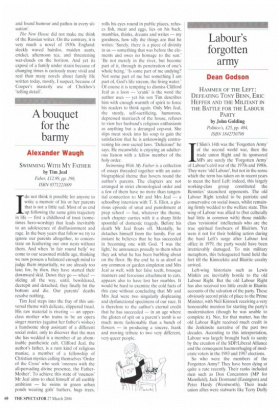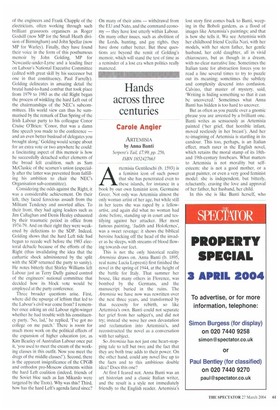Labour's forgotten army
Dean Godson
HAMMER OF THE LEFT: DEFEATING TONY BENN, ERIC HEFFER AND THE MILITANT IN THE BATTLE FOR THE LABOUR PARTY by John Golding Politico's, £25, pp. 404, ISBN 1842750798 If Slim's 14th was the 'Forgotten Army' of the second world war, then the trade union Right and its sponsored MPs are surely the 'Forgotten Army' of Labour's civil war of the 1970s and 1980s. They were 'old Labour', but not in the sense which the term has taken on in recent years to mean the hard Left: indeed, this largely working-class group constituted the Bennites' staunchest opponents. The old Labour Right tended to be patriotic and conservative on social issues, whilst remaining firmly wedded to the welfare state. This wing of Labour was allied to (but culturally had little in common with) those middleclass 'revisionist' intellectuals who are the true spiritual forebears of Blairism. Yet were it not for their holding action during the hard Left's surge after Labour lost office in 1979, the party would have been irretrievably damaged. To mix military metaphors, this beleaguered band held the fort till the Kinnockite and Blairite cavalry arrived.
Left-wing historians such as Lewis Minkin are inevitably hostile to the old Labour Right. But the old Labour Right has also received too little credit in Blairite accounts of the salvation of the party. These obviously accord pride of place to the Prime Minister, with Neil Kinnock receiving a very honourable mention for starting the party's modernisation (though he was unable to complete it). Nor, for that matter, has the old Labour Right received much credit in the Jenkinsite narrative of the past two decades. According to this interpretation, Labour was largely brought back to sanity by the creation of the SDP/Liberal Alliance and the consequent haemorrhaging of moderate voters in the 1983 and 1987 elections.
So who were the members of the Forgotten Army? They have been dying at quite a rate recently. Their ranks included men such as Don Concannon (MP for Mansfield), Jack Dormand (Easington) and Peter Hardy (Wentworth). Their trade union allies were stalwarts like Terry Duffy of the engineers and Frank Chapple of the electricians, often working through such brilliant grassroots organisers as Roger Godsiff (now MP for the Small Heath division of Birmingham) and John Spellar (now MP for Warley). Finally, they have found their voice in the form of this posthumous memoir by John Golding, MP for Newcastle-under-Lyme and a leading fixer on Labour's National Executive Committee (edited with great skill by his successor but one in that constituency. Paul Farrelly). Golding delineates in amazing detail the brutal hand-to-hand combat that took place from 1979 to 1983 as the old Right began the process of winkling the hard Left out of the chairmanships of the NEC's subcommittees. His world view can thus be summarised by the remark of Dan Spring of the Irish Labour party to his colleague Conor Cruise O'Brien: `Conor, that was a damn fine speech you made to the conference — and an even better busload of delegates you brought along.' Golding would scrape about for an extra vote or two anywhere he could: a fascinating aspect of this memoir is how he successfully detached softer elements of the broad left coalition, such as Sam McCluskie of the seamen's union (especially after the latter was prevented from fulfilling his ambition to chair the NEC's Organisation sub-committee).
Considering the odds against the Right, it was a considerable achievement. On their left, they faced ferocious assault from the Militant Tendency and assorted allies. To their front, they had aging leaders such as Jim Callaghan and Denis Healey exhausted by their traumatic period in office from 1974-79. And on their right they were weakened by defections to the SDP. Indeed, Golding shows that the hard Left tide had begun to recede well before the 1983 electoral debacle because of the efforts of the Right (thus invalidating the idea that the cathartic shock administered by the split with the SDP returned the party to sanity). He notes bitterly that Shirley Williams left Labour just as Terry Duffy gained control of the engineers' national committee that decided how its block vote would be employed at the party conference.
Three broader questions arise. First, where did the upsurge of leftism that led to the Labour's civil war come from? I remember once asking an old Labour right-winger whether he had trouble with his constituency party. 'No, lad,' he replied, 'I've got no college on me patch.' There is room for much more work on the political effects of the expansion of higher education (or, as Kim Beazley of Australian Labour once put it, you used to meet the cream of the working classes in this outfit. Now you meet the dregs of the middle classes!'). Second, there is the apparent insignificance of the CPGB and orthodox pro-Moscow elements within the hard Left coalition (indeed, friends of the Soviet bloc such as Ian Mikardo were targeted by the Trots). Why was this? Third, how has the hard Left's agenda fared since? On many of their aims — withdrawal from the EU and Nato, and the command economy — they have lost utterly within Labour. On many other issues, such as abolition of the Lords, hunting, and gay rights, they have done rather better. But these questions are beyond the remit of Golding's memoir, which will stand the test of time as a reminder of a lost era when politics really mattered.



























































































 Previous page
Previous page